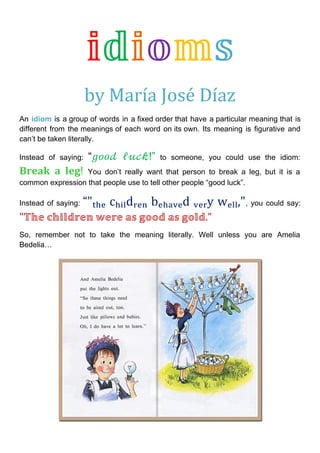Idioms (blog), by Mar¨ªa Jos¨¦ D¨ªaz Vidarte
- 1. ?????? by Mar¨ªa Jos¨¦ D¨ªaz An idiom is a?group?of words in a?fixed?order?that have a?particular?meaning?that is different from the?meanings?of each word on?its?own. Its meaning is figurative and can¡¯t be taken literally. Instead of saying: ¡°???? ????!¡± to someone, you could use the idiom: ????? ? ???! You don¡¯t really want that person to break a leg, but it is a common expression that people use to tell other people ¡°good luck¡±. Instead of saying: ¡°"??? c???d??? b?????d ???y w???,", you could say: "??? ???????? ???? ?? ???? ?? ????." So, remember not to take the meaning literally. Well unless you are Amelia Bedelia¡
- 2. Clearly, her employer just wanted her to ¡°turn the lights off¡± when she was told to ¡°put the lights out." In the following picture, Mr. Rogers wanted to begin the journey and see what she understood: To learn more about Amelia Bedelia and learn idioms with her visit : https://en.wikipedia.org/wiki/Amelia_Bedelia https://en.wikipedia.org/wiki/Amelia_Bedelia_(book) https://www.ameliabedeliabooks.com/ Now, try this activity with idioms¡ Match each idiom with its meaning Be in hot water Never A piece of cake Feel ill Hit the sack Go to bed
- 3. Feel under the weather Something very easy When pigs fly Be in serious trouble



